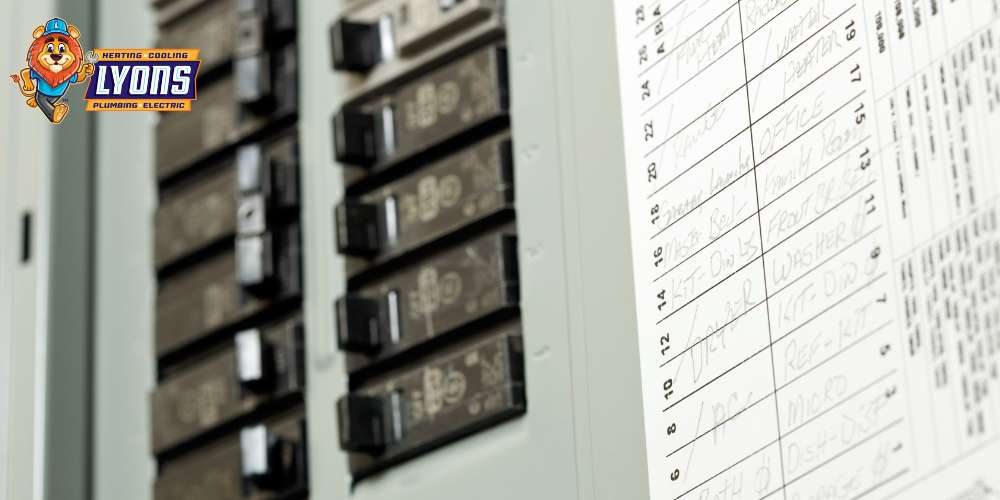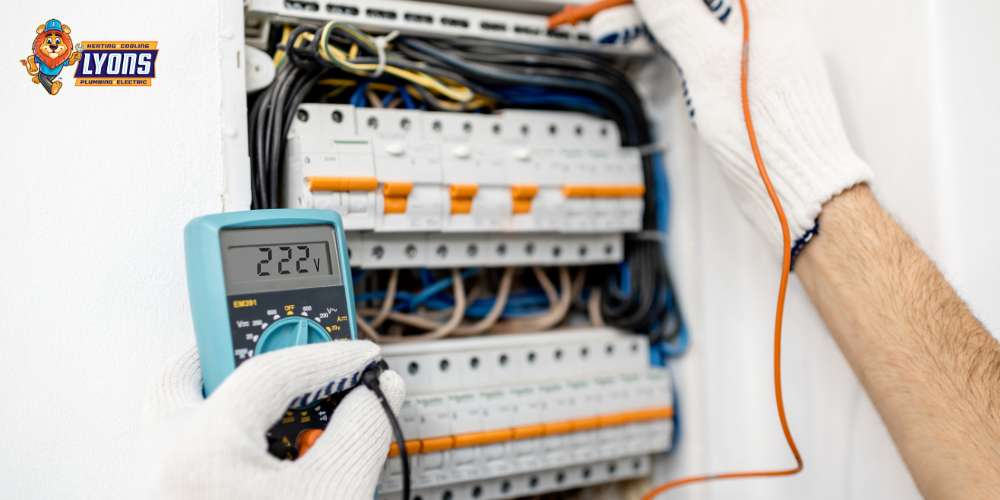Knowing your home or business’s electrical load capacity is key to avoiding overloaded circuits, unexpected power failures, or an electrical fire. Whether you’re installing new appliances or wondering how much electricity your system can handle, an electrical load calculation is the first step to safe and efficient energy use.
At Lyons Electric, we help Rockwall, TX, homeowners, and businesses calculate electrical load capacity to prevent strain on the electrical service panel and keep all the appliances running smoothly. Our team can determine how much power your home or business uses, recommend upgrades, and precisely handle all installations.
Need a Rockwall electrician to ensure your home or business is running safely and efficiently? Call us today at (469) 224-1512 or reach out online to schedule an appointment!
What is Electrical Load Calculation?
Electrical load calculation is the process of figuring out the amount of power a home or business needs to safely run all the appliances, lights, and electrical devices. It helps determine whether your electrical panel and wiring can handle the total load without the risk of overload, which can lead to tripped circuit breakers, power failures, or an electrical fire.
By using a few different formulas, electricians calculate the amperage load and wattage ratings of everything plugged into your system, ensuring that the electrical service panel can support daily use. A proper load calculation improves energy efficiency and ensures compliance with local electrical codes, preventing costly issues down the road.
If your service panel is outdated or you’re adding new appliances, upgrading your system may be necessary to handle the electrical load safely. If you’re unsure whether your home is up to code, it’s best to hire a licensed electrician like those at Lyons for your Rockwall electrical panel service to assess your electrical capacity before problems arise.
What is a Load in a Circuit?
A load in a circuit refers to any electrical device, appliance, or system that consumes power when connected to your electrical panel. Every time you turn on a light, microwave, refrigerator, dishwasher, dryer, heater, furnace, air conditioner, or any other appliance, it adds to the total electrical load on your system. Larger homes and businesses with a higher capacity need to carefully calculate electrical load to keep everything running safely and efficiently.
HVAC systems, including heat pumps and air conditioners, are some of the biggest contributors to a home’s amperage load. They require a dedicated circuit breaker to handle the amount of power they use. Even smaller electronics like TVs, computers, and chargers contribute to the total load, affecting the electrical capacity of your system.
Understanding how all the appliances in your home or business affect your service panel can help prevent tripped breakers and potential safety hazards.

How To Do a Load Calculation for House
Before adding new appliances or making changes to your home’s electrical service, it’s important to perform an electrical load calculation. This process helps determine the power needed to run your home safely without overloading the system.
Using different formulas, homeowners can estimate their total electrical load, ensuring their system has the minimum capacity required for everyday use.
The following sections break down the key steps to help you understand how to calculate your home’s electrical load.
Assessing Total Connected Load
The first step in performing an electrical load calculation is determining the total amount of power your home uses. This includes all appliances, lighting, and electronics that draw electricity from your service panel.
Each device has a power rating (measured in watts), which tells you how much electricity it consumes. To prevent circuit overload, you need to determine whether your system can handle the maximum load required at any given time.
How To Calculate Watts
A simple formula to determine the power needed for each device is Volts x Amps = Watts.
For example, if an appliance operates at 120 volts and draws 10 amps, it uses 1,200 watts of electricity. By adding up the wattage of all the appliances and electrical devices in your home, you can determine the total electrical load and compare it to your system’s minimum capacity.
How To Calculate Amps
To determine how many amps your home requires, use another simple formula: Watts ÷ Volts = Amps.
If your home’s total wattage is 24,000 watts, and your system runs on 240 volts, the total amperage needed is 100 amps. If your existing electrical panel cannot support this larger number, an upgrade may be necessary to prevent circuit overload and ensure safe operation.
Understanding Demand Factors
Not all appliances and electrical devices run simultaneously, so electricians use demand factors to estimate the actual power needed.
For example, kitchen appliances, air conditioners, and heating systems may require more power during peak hours, while lights and smaller devices use less electricity. By applying these calculations, you can determine whether your home’s electrical capacity is sufficient or if an upgrade is necessary to handle the maximum amount of demand safely.
Calculating Branch Circuits and Service Loads
Each circuit breaker in your home is designed to handle a specific power rating to prevent circuit overload. Larger appliances like dishwashers, dryers, and refrigerators require dedicated branch circuits, while lighting and outlets are usually distributed across general circuits.
Properly balancing your breaker’s size and total electrical load helps maintain efficiency and avoid unnecessary trips or electrical failures.
Using Professional Services
While basic electrical load calculations can be done using different formulas, an accurate assessment requires the help of a licensed professional.
An experienced Rockwall electrician can evaluate your service panel, assess whether your system meets the minimum capacity required, and determine if upgrades are needed for higher-capacity appliances.
If you are planning renovations, adding new appliances, or experiencing electrical issues, having a professional electrical inspection in Rockwall, TX is best to prevent potential safety hazards.

Home Load Calculation
Home load calculation helps homeowners determine whether their electrical service panel can handle their power needs and future upgrades. A typical home requires enough voltage to support everyday appliances like refrigerators, air conditioners, and dishwashers while also keeping a safety margin to prevent overload.
The National Electrical Code states that a home’s electrical load should not exceed 80% of its total electrical capacity to avoid straining the system. This helps protect against power failures and reduces the risk of an electrical fire. Understanding watts, volts, and amps and the power rating of the devices in your home is essential for safely distributing electrical load across circuits.
If you plan to install new appliances or expand your home, checking your load calculation now can help you prepare for the future and prevent pricey electrical issues later on.
Commercial Load Calculation
Commercial load calculation is essential for businesses to keep their operations running without electrical failures or safety hazards. Unlike homes, commercial buildings and industrial facilities often have higher capacity needs due to large equipment, office electronics, HVAC systems, and heavy machinery. Proper electrical load calculation helps businesses determine the power needed for daily operations while maintaining energy efficiency.
Managing wattage ratings and distributing electrical load across circuits can reduce energy waste and lower utility costs. Additionally, planning for future business growth is important—installing an electrical service panel that can handle new appliances or an expanding workspace ensures that upgrades can be made without the risk of overload.
A commercial Rockwall electrician at Lyons can help create an execute a well-planned load calculation that allows local businesses to operate efficiently, reduce downtime, and stay prepared for future expansion.
Risks of Incorrect Load Calculations
Incorrect electrical load calculations can lead to serious risks, including electricity overload, frequent circuit breaker trips, and even an electrical fire.
If a system is not adequately sized to handle the total electrical load, it can cause overheating in the wiring, damage to electrical devices, and reduce the lifespan of appliances. An overloaded service panel may struggle to supply the power needed, resulting in flickering lights, power surges, or complete system failure. Additionally, failing to leave a safety margin by exceeding 80% of electrical capacity increases the risk of dangerous electrical issues.
For businesses, improper load calculation can lead to expensive equipment damage and operational downtime. Whether for a home or commercial space, working with a licensed electrician to determine the correct electrical load capacity is essential to maintaining a safe and reliable system.
How Lyons Electric Can Help with Electrical Load Calculations
At Lyons Electric, we have the knowledge and experience to perform precise electrical load calculations for homes and businesses in Rockwall, TX.
Our team is trained to properly calculate electrical load capacity, ensuring that your service panel can safely power your home or business. We also follow local electrical codes to prevent circuit overload and ensure your system runs efficiently.
In addition to electrical inspections and load calculations, we also a range of other electric services, including rewiring services, energy efficiency consultations, and more to help improve your electrical system.

Contact Lyons Electric for Expert Electrical Load Calculations in Rockwall, TX
Making sure your home or business can handle the total electrical load it requires is key to preventing power failures, circuit overload, or even an electrical fire. Whether you’re adding new appliances, upgrading your electrical panel, or planning for future additions, a proper electrical load calculation is essential to keeping your system running safely and efficiently.
At Lyons Electric, we take the guesswork out of calculating electrical load by offering expert assessments tailored to your needs. Our team ensures that your electrical capacity meets local codes and provides room for growth so you won’t run into unexpected issues down the road.
Don’t wait until your system is overloaded—call (469) 224-1512 or contact us online to schedule your service today!



